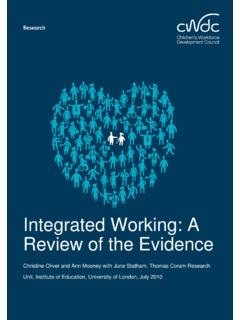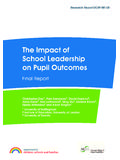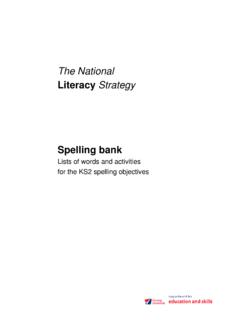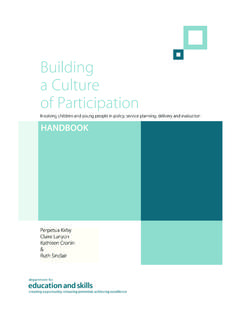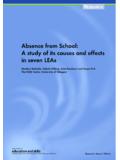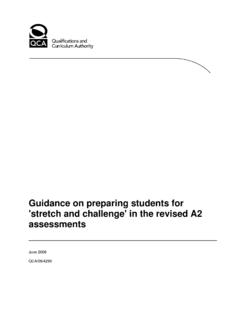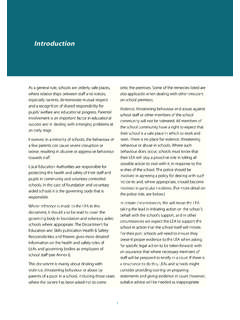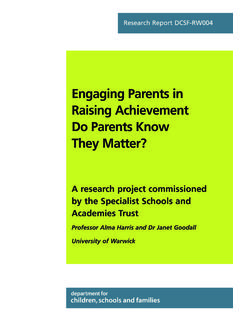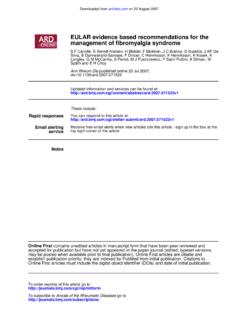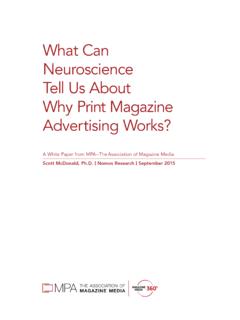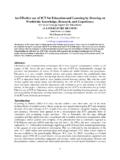Transcription of Impact of Alcohol Consumption on Young People
1 Impact of Alcohol Consumption on YoungPeopleA Systematic review of Published ReviewsResearch Report DCSF-RR067 Dorothy Newbury-Birch, Janet Walker, Leah Avery,Fiona Beyer, Nicola Brown, Katherine Jackson, Catherine A Lock, Ruth McGovern and Eileen Kaner (Institute of Health and Society, Newcastle University)Eilish Gilvarry (Northumberland, Tyne and Wear Drug and Alcohol Service)Paul McArdle and Venkateswaran Ramesh (Northumberland Tyne and Wear NHS Trust)Stephen Stewart (Freeman Group of Hospitals NHS Trust) I Impact of Alcohol Consumption on Young People A Systematic review of Published Reviews Dorothy Newbury-Birch, Janet Walker, Leah Avery, Fiona Beyer, Nicola Brown, Katherine Jackson, Catherine A Lock, Ruth McGovern and Eileen Kaner (Institute of Health and Society, Newcastle University) Eilish Gilvarry (Northumberland, Tyne and Wear Drug and Alcohol Service) Paul McArdle and Venkateswaran Ramesh (Northumberland Tyne and Wear NHS Trust) Stephen Stewart (Freeman Group of Hospitals NHS Trust) The views expressed in this report are the authors and do not necessarily reflect those of the Department for Children, Schools and Families.
2 Newcastle University 2009 ISBN 978 1 84775 327 4 Research Report No DCSF-RR067 1 Contents Executive Summary 2 1. Introduction 7 Background 7 Operationalising harms and benefits of Alcohol in Young People 9 2. Methods 11 Criteria for including studies in the review 11 Search strategy for identification of studies 12 review strategy 13 3. Findings 15 4. Findings - Health 16 Acute and chronic health problems 16 Genetics 18 Effect on brain development 20 Mental health 23 Personality 24 5. Findings - Social 27 Age of first drinking 27 Family effects of children s drinking 28 Peer Groups 29 Alcohol and other drug use 31 Sexual risk taking 31 Academic performance 32 Offending 33 Religion 34 6. Summary of findings and concluding remarks 35 7.
3 References 41 8. Acknowledgements 49 Appendices 50 Appendix 1: Example search 50 Appendix 2: Data extraction form 51 Appendix 3: Quality assessment of review 52 Appendix 4: Identification of included reviews 54 Appendix 5: Abbreviations 55 Appendix 6: Details of reviews 56 Tables Table 1: Grading of reviews used / not used in report 15 Table 2: Alcohol attributable fractions (AAFs) for Young People 17 Table 3: Summary of findings 37 Figures Figure 1: Predictors of and risks to children who drink 10 2 Executive Summary This review of reviews relating to the Impact of Alcohol Consumption on Young People was undertaken between May and October 2008 by a research team based at the Institute of Health and Society at Newcastle University. The work was commissioned by the Department for Children, Schools and Families (DCSF) - Tender No: eor/sbu/2008/007.
4 Aims and Objectives The aim of the study was to undertake a systematic review of the published review literature and summarise the evidence on the harms and benefits of Alcohol Consumption for children and Young People . In this process we assessed the quality of the evidence in this field and its relevance to a UK population. We also identified gaps in the research which need to be addressed. Methods and Limitations After a systematic search of the published evidence, 162 eligible reviews were found. These reviews were graded in terms of methodological quality and the strength of the conclusions that could be drawn from them. In the final narrative, 102 reviews were summarised to consider the Impact of drinking on Young People . The unused reviews consisted of duplicate material, older reviews and/or those of poorer methodological quality. This report takes the form of a narrative summary of the reviews findings.
5 For ease of reading, references are presented using the Vancouver system in which each one is represented in the text by a unique number and then all are ordered numerically in a reference list at the end of the report. The evidence-base included many older reviews and there was a preponderance of research from the USA. In addition, the literature focused on adolescents and older teenagers but there was little information about prepubescent children. As a result, this body of work has limited generalisability to contemporary drinking by Young People in England, particularly in younger children. Moreover, many of the reviews were methodologically weak and so it is not possible to discount bias from their findings. Lastly, most of the reviews were based on cross-sectional research which is unable to determine a causal link between risk factors and Alcohol misuse, or indeed, between Alcohol misuse and specific health or social consequences.
6 It is not clear whether current adult guidance on low risk drinking is pertinent to Young People or if specific recommendations are required for individuals who are in the midst of ongoing physiological and emotional development. The review has confirmed that there is a lack of good review evidence available about the Impact of drinking on children and Young People . However, an absence of evidence in this field does not mean that there is evidence of no Impact of Alcohol on such individuals. Despite the methodological weakness of research in this field, there is a large body of evidence which reports consistent trends between Alcohol use and a range of adverse effects. This convergence allows us to draw credible conclusions about the Impact of drinking on Young People (particularly around or following puberty). Below we have summarised the review evidence on risks and protective factors that influence Alcohol misuse by Young People and also the possible adverse or beneficial consequences associated with children and Young People drinking Alcohol .
7 We have noted areas where there were gaps or deficiencies in the evidence base. 3 I. Risks Associated with Alcohol Misuse in Children and Young People The evidence suggests that there are a number of risk factors associated with Alcohol misuse by children and Young People . These include: a genetic predisposition (generational transmission) physical and sexual abuse in childhood, which may lead to later drinking behaviour early exposure to drinking Alcohol , which may increase the risk of problematic drinking in adolescence behavioural patterns of Alcohol Consumption of parents, grandparents and siblings family history of Alcohol problems early behaviour problems in children, which may place them at especially high risk of Alcohol problems, particularly if there is a family history of Alcohol problems antisocial behaviour and inter-personal problems in pre-adolescent children.
8 Which may be predictive of substance use disorders children and Young People who are sensation-seeking or have impulsive personality types may drink in large quantities heavy and binge drinking by Young People can be a mechanism for coping with stress or anxiety there may be gender differences between mothers and fathers in terms of their influence on the behaviour of sons and daughters involvement in drinking games can lead to very high levels of Alcohol Consumption Mechanisms to protect children and Young People , such as excessive criticism of their drinking behaviour, may not be protective but harmful. Young People should be advised and supported to rely less on Alcohol to facilitate social integration with their peers and to develop other more constructive peer group relationships. II Protective Factors that Inhibit Alcohol Misuse in Children and Young People Protective factors are very important as they can ameliorate risk factors.
9 Our examination of the evidence about protective factors has shown that: the location of a Young person s first drink may be important to future Alcohol misuse, children who first use Alcohol in a home environment and learn about its effects from parents are less likely to misuse Alcohol than those who begin drinking outside the home and experiment with peers delaying the time of a Young person s first drink may reduce the risk of harmful drinking. 4 having adults who retain good relationships with a Young person, characterised by appropriate levels of support and control, is likely to be protective controlled Alcohol use is not in itself predictive of negative outcomes religious affiliation, especially attendance at religious services, may have a protective effect against Alcohol Consumption Key factors that seem to buffer the adverse effects of Alcohol Consumption in children and Young People include informed and supportive parental guidance about Alcohol and a delay in the age of initiation into drinking.
10 III Adverse Consequences of Drinking Alcohol for Children and Young People We are able to say with confidence that there are potentially adverse consequences for children and Young People who misuse Alcohol . The evidence suggests that: adolescents who misuse Alcohol are more likely to suffer from side effects including appetite changes, weight loss, eczema, headaches and sleep disturbance the most common impacts of Alcohol intoxication are vomiting and coma Young People are not immune to the chronic diseases and conditions associated with excess Alcohol Consumption in adults, and deaths from liver disease are now occurring at younger ages adolescents and Young People who drink and drive, or allow themselves to be carried by a drink driver, are more likely to be involved in a car accident adolescents and Young People who drink Alcohol are more likely to sustain an injury, often as a result of an assault Alcohol abuse in adolescence, during a developmentally sensitive period.
